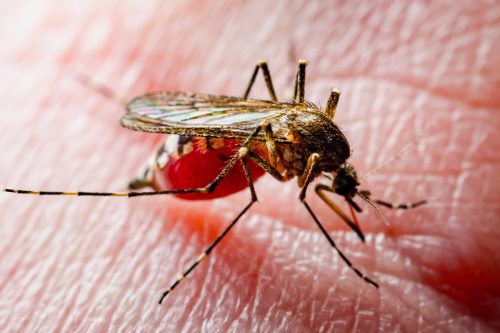5 Symptoms of Malaria, as First U.S. Cases in 20 Years Strike Florida and Texas
The first occurrence of local transmission within the country in two decades.

In the past two months, the United States has recorded five instances of malaria, an infection transmitted by mosquitoes. This marks the first occurrence of local transmission within the country in two decades. According to the Centers for Disease Control and Prevention, four of these cases were identified in Florida, with the fifth case reported in Texas. The organization stated that these cases are suspected to be locally acquired. However, this situation raises concerns about the possibility of an increase in imported malaria cases due to heightened international summer travel. “Malaria is a serious and potentially fatal disease transmitted through the bite of an infective female anopheline mosquito,” says the CDC. “Malaria is a medical emergency and should be treated accordingly. Patients suspected of having malaria should be urgently evaluated in a facility that is able to provide rapid diagnosis and treatment, within 24 hours of presentation.” Read on to learn more about the symptoms.

The hallmark symptom of malaria is a high fever. It typically presents with a sudden onset, accompanied by chills and rigor. The fever associated with malaria often follows a cyclic pattern, with symptoms recurring every 24 to 48 hours, depending on the type of malaria parasite involved. During fever episodes, the body temperature can rise rapidly, causing discomfort and profuse sweating once the fever subsides.

Malaria can cause significant fatigue and weakness in affected individuals. This symptom often persists even after the fever subsides. The ongoing destruction of red blood cells by the malaria parasites can lead to anemia, contributing to feelings of exhaustion and overall weakness. Patients may experience difficulty in carrying out daily activities and may require frequent rest periods to recover.

Headaches and body aches are common complaints among individuals with malaria. The severity of these symptoms can vary, ranging from mild discomfort to severe migraines. The headaches may be accompanied by muscle and joint pain, making movement uncomfortable. These symptoms often intensify during the fever episodes, further adding to the discomfort experienced by the affected individuals.

Malaria can also affect the gastrointestinal system, leading to symptoms such as nausea, vomiting, and diarrhea. These digestive disturbances can be quite distressing and contribute to dehydration in affected individuals. The combination of fever, gastrointestinal symptoms, and fatigue can significantly impact a person’s overall well-being and ability to perform daily tasks.

In some cases of severe malaria, the parasite can cause enlargement of the spleen and liver. These organs play important roles in the body’s immune response and blood filtration. When infected with malaria, they may become swollen and tender to the touch. Enlarged spleen and liver can cause discomfort and pain in the abdominal region and may be detected during physical examination by a healthcare professional.

While the aforementioned symptoms are the most common, malaria can also present with other manifestations, including a dry cough, chest pain, confusion, and seizures. These symptoms are more common in severe cases of malaria or in infections caused by certain species of malaria parasites. Prompt medical attention is crucial if these symptoms arise, as they may indicate a more severe form of the disease.
It is important to note that the symptoms of malaria can mimic those of other common illnesses, making accurate diagnosis essential. If you experience any of the aforementioned symptoms, particularly if you have recently traveled to a malaria-endemic region, it is advisable to seek medical attention promptly. Early diagnosis and appropriate treatment are vital in managing malaria and preventing complications associated with the disease.

“Clinical manifestations of malaria are non-specific and include fever, chills, headache, myalgias, and fatigue. Nausea, vomiting, and diarrhea may also occur. For most people, symptoms begin 10 days to 4 weeks after infection, although a person may feel ill as early as 7 days or as late as 1 year after infection. If not treated promptly, malaria may progress to severe disease, a life-threatening stage, in which mental status changes, seizures, renal failure, acute respiratory distress syndrome, and coma may occur,” says the CDC.














